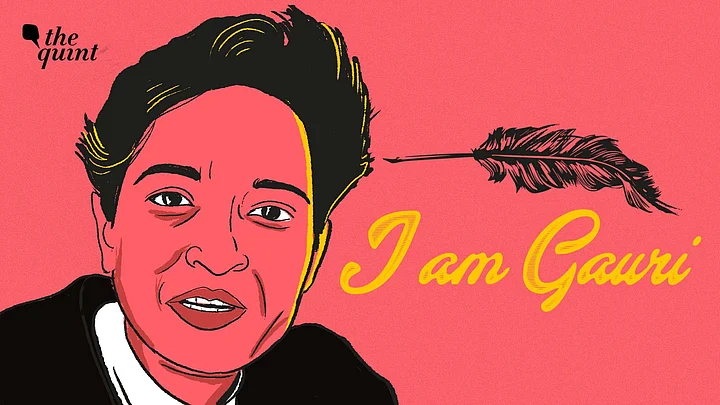It has been five years since Gauri Lankesh, journalist and activist, was shot dead by alleged right-wing extremists in front of her house in Bengaluru’s Rajarajeshwari Nagar. Gauri, who was widely respected for her fearless reportage and known for speaking truth to power, had also worked for the upliftment of the marginalised and ensuring communal harmony.
The heinous act committed on 5 September 2017, which left Gauri lying in a pool of blood, created a a huge void in the progressive thinking space of the state. Today, as Karnataka is grappling with rising communal tensions and political violence across the state, Gauri’s writings become most relevant and continue to inspire generations.
Gauri Lankesh Murder: The Case as Investigated by the SIT
At first, the SIT team investigating the case was led by IPS officers MN Anucheth and P Rangappa. In March 2018, it arrested Naveen Kumar, an activist belonging to Hindu Yuva Sene, on the charges that he had conspired to kill Gauri Lankesh.
After eight months, in November 2018, the SIT filed another charge sheet, which ran to nearly 10,000 pages and mentioned 18 people who were allegedly involved in the murder of the Lankesh Patrike editor. This included Parashuram Waghmare, Amol Kale, Sujith Kumar, and Amit Digwekar – all of whom had alleged links with right-wing organisations such as Sanathan Sanstha and Sri Ram Sene.
With 18 people being arrested and the trial underway, convictions still seem distant. However, the police sources told The Quint that they have a solid case at hand.
In an interaction with The Quint, a police officer from the investigating team said, “The accused have been booked under section 302, 120B and other sections of the Indian Penal Code for murder, criminal conspiracy and offences carried out with criminal knowledge and intent.”
The accused have also been framed under the Karnataka Organised Crime Act, 2000, and the Arms Act, 1959, and the police feel that the murder of Gauri Lankesh was linked to the brutal murders of the other rationalist thinkers – Narendra Dabholkar, Govind Pansare, and MM Kalaburagi.
Nearly five years after Gauri Lankesh was shot dead, a special court in Karnataka presided over the hearing of the case on 4 July 2022. The trial is being held every second week of the month for five consecutive days.
Asserting that the killings were due to ideological reasons, the SIT told the court that Gauri Lankesh was targeted for her views and stands opposing the Hindutva organisations. The SIT backed this investigative lead by providing evidence of Amol Kale’s diary.
The personal diary of Kale had a list of 36 names, which included writer Baragur Ramachandrappa, poet Chennaveera Kanavi, Dalit author Banajagere Jayaprakash, late playwright Girish Karnad, former IAS officer SM Jamdar, rationalist Narendra Nayak and others.
Murder Trial Resumes at Snail's Pace
One of the first person to make a statement before the court was Gauri Lankesh’s sister Kavitha Lankesh. Kavitha, who is also a film-maker and poet, told the Karnataka Control of Organised Crime Act (KCOCA) special court that Gauri had mentioned about some men lurking suspiciously near her house. The court also observed that the incident had taken place just a few days before the murder.
Other witnesses who appeared and testified before the special court were Gauri Lankesh’s neighbour, who saw the alleged shooters escaping after firing the bullets, a cable operator who found Gauri at the spot, a forensic expert, and a police officer.
Meanwhile, the defence tried to insinuate personal feud in the Lankesh family and also raked Gauri Lankesh's alleged Naxalite connections.
Justice Chandrashekhar Mrutyunjaya Joshi, the presiding judge in the case, also struck down the defence's argument of trying to link Gauri Lankesh to the activism of Jignesh Mevani and Kanhaiya Kumar – terming them 'tukde tukde gang.'
On the request of the defence counsel, the special public prosecutor also submitted two separate files of footage of the crime scene from the CCTV cameras that were set up outside Gauri Lankesh's residence.
The SIT maintains that they were able to identify and apprehend the shooters based on these two clips of footage.
The special court also examined three other witnesses – two policemen and a PWD engineer in relation to the case.
Justice CM Joshi oversaw the special public prosecutor examine inspector Shiva Reddy, who recreated the crime scene along with alleged shooter Parashuram Waghmare, and the defence also cross-examined him.
The second witness, constable Vinod Kumar, and third witness, VN Kalageri, an assistant engineer with the Public Works Department, were also examined by the court, for having drawn a map of crime scene for police investigation.
However, the trial is likely to slow down as the presiding judge Chandrashekar Mrutyunjaya Joshi was elevated to the Karnataka High Court earlier last month.
(At The Quint, we question everything. Play an active role in shaping our journalism by becoming a member today.)
